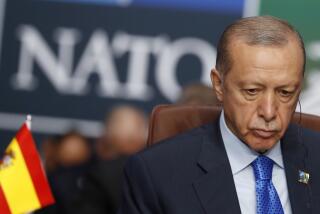Turkish Military Sees EU Entry Terms as a Threat to Its Power
- Share via
ANKARA, Turkey — At home and in their volatile neighborhood, which includes the Balkans, the Caucasus mountains and the Middle East, the swaggering generals of Turkey are accustomed to getting their way.
In the past three years, they have rid their nation of an Islamist-led government, crushed a Kurdish separatist insurgency, dissuaded Greek Cypriots from deploying Russian-made missiles against Turkish warplanes, forged a defense pact with Israel and begun a shopping spree for tanks and attack helicopters. Threats to Turkey’s security, by their own assessment, are at the lowest ebb in decades.
Now the commanders of NATO’s second-largest military force are staring uneasily at a most unconventional challenger: the European Union.
Europe’s leaders have accepted Turkey as a candidate for membership in the union and now expect the nation’s military to give up the powerful role it has played for 76 years as self-appointed guardian of the republic’s internal order. That is a demotion the commanders are clearly reluctant to take.
Arguing that Turkey’s elected civilian leaders are often lax in dealing with Kurdish separatists and Islamic fundamentalists, the military exercises broad constitutional authority to intrude in the governance of this mostly Muslim nation. Due to Turkey’s strategic value, its strongest ally, the United States, has tolerated much of this meddling. Europeans, however, want it stopped.
Efforts to End Military’s Influence
Negotiations over Turkey’s terms of entry to the EU are expected to last for years and cover thousands of laws and regulations, on issues ranging from child labor to the size of bananas. Of all the changes the EU is seeking, none would transform Turkey as deeply as the generals’ submission to civilian control.
That prospect has energized Turkey’s beleaguered advocates of democracy and human rights, who contend that the military must surrender its Big Brother role to the EU.
“There should be a revision of the entire security doctrine, the deployment and the structure of the armed forces of Turkey, whose territorial integrity can now be placed under European guarantee,” Cengiz Candar, a columnist persecuted in the past for challenging the military, wrote recently in the mass-circulation Istanbul newspaper Sabah.
Publicly, the generals say they support EU membership because it would fulfill the secular, Europe-oriented vision of Kemal Ataturk, the general who founded the army and the republic on the Ottoman Empire’s ruins. More practically, they don’t want to be excluded as Europe forms defense organizations independent of the North Atlantic Treaty Organization.
But only in recent weeks have the generals begun a detailed study of how they might be affected by the EU imperative that aspiring members achieve “stability of institutions guaranteeing democracy, the rule of law, human rights and respect for minorities.”
“They’re trying to figure out what they can offer as concessions, because they know they’re going to take a lot of heat” for their political role, said a Western diplomat familiar with the deliberations. “They’re also trying to figure out how they can forestall any changes as long as possible.”
Signs of irritation and resistance have surfaced in comments by senior officers and in a memo distributed by the general staff to rank-and-file units just before the EU voted in December to make Turkey a candidate.
The memo focused on two membership conditions often spelled out by European leaders: that Turkey abolish its military-dominated National Security Council and subordinate the general staff to the civilian Defense Ministry.
“These efforts to change the administrative structure of Turkey,” the memo said, “result either from an ignorance of history or, worse, a desire to unjustly attack and weaken the Turkish armed forces.”
Retired army Gen. Cevic Bir, the most openly interventionist general staff officer of the late 1990s, told the Turkish daily Hurriyet: “From now on the army says there will be no more coups. Isn’t that change enough?”
Turkey has been under direct military rule three times since 1960. Before withdrawing for the third time, in 1983, the generals wrote a new constitution enhancing their power to run things behind the scenes.
One center of that power rests on well-kept grounds at the edge of this capital in a six-story building with long, red-carpeted hallways. Here, at headquarters of the National Security Council, a four-star general employs about 2,000 specialists, including 350 permanent staff members, to set the government’s agenda on matters ranging from education and hydroelectric energy to relations with Turkey’s neighbors.
In the military’s view, “practically everything in public life is related to national security,” said a civilian who works in this policy planning center and likens it to a parallel government. “Everything must be secure.”
Control of the planning operation gives the armed forces the upper hand in decision-making by the Security Council itself, which is made up of Turkey’s president, four senior Cabinet ministers and the five top military commanders. “The military always comes better prepared than the civilians and takes the initiative,” said retired army Gen. Dogan Gures, a former council member.
Some of the military’s initiatives are ultimatums.
In 1997, the commanders used the Security Council’s monthly meetings to badger Necmettin Erbakan, the nation’s first Islamist prime minister, into agreeing to curb Muslim religious schools and foundations. When the government balked at complying, the commanders orchestrated a campaign by pro-secular business, labor and women’s groups that forced Erbakan to resign.
The armed forces have other powers, privileges and obsessions that would be unthinkable in the democracies of Europe.
They report to the prime minister, not the defense minister, and once attacked Kurdish rebel bases in Iraq without telling either one. They take 9% of the national budget without a word of debate in parliament and spend without civilian oversight. They control weapons procurement, much of it from defense companies they own, and have extensive business holdings in Turkey.
Senior officers lobby quietly to maintain laws curbing free expression and encourage prosecutors to open criminal cases against those who challenge the military’s views.
The briefest comment by a senior commander can sway a vote in parliament or silence a critic. A general once demanded that an Istanbul soccer club discipline its British coach, who had protested the army’s conscription of a star player. The club and the coach apologized.
A Turkish officer’s swagger comes with his training and is sustained by genuine respect from most of this society. From age 14, military school cadets are taught that they are superior to civilians.
“They teach you to obey the rules of democracy as long as there is stability in the country,” said retired air force Lt. Col. Metehan Demir. “But they also teach that if there is instability, you have a special duty to intervene.”
The anti-militarist sentiment prevalent in much of Western Europe is weak in Turkey, where governments are chronically unstable and politicians are held in low esteem. Polls usually give the military approval ratings of around 75%, making it one of the nation’s most respected institutions.
Some recent events, however, have tarnished that aura. The military was widely criticized for a sluggish search-and-rescue effort after a magnitude 7.4 earthquake last August. Troubling accusations have followed its victory last year over Kurdish guerrillas.
A book of interviews with 42 army veterans of the Kurdish conflict, the first such work published in Turkey, accused some commanders of mistreating civilians and turning a blind eye to war profiteers and drug smugglers. A ban on the book and the prosecution of the interviewer, Nadire Mater, on charges of insulting the armed forces only prompted its distribution over the Internet to a wider audience.
Pro-democracy forces hope that Turkey’s new status as an EU candidate will help restrain the military and protect a budding campaign to curb its political power.
Campaign for a ‘Civilian’ Constitution
European opposition has already prompted Turkey to remove military judges from its State Security Courts and delay the execution of Abdullah Ocalan, the Kurdish rebel leader who was captured last year and convicted of treason.
A coalition of prominent lawyers and intellectuals has launched a campaign for a “civilian” constitution. The most powerful industrialists union, Tusiad, has called for a gradual subordination of the military and the Security Council.
Prime Minister Bulent Ecevit has rejected such demands and tried to discourage open debate.
The general staff has declined to receive diplomats and other foreign visitors, frustrating efforts to engage it in charting a step-by-step course for Turkey’s progress toward EU membership.
One of the few officers to speak publicly on the subject is retired Adm. Salim Dervisoglu.
In a recent interview with Hurriyet, he said the armed forces see EU membership as “a must” and may consider some adjustments in the Security Council’s makeup “in the future, not now, if Turkish democracy can prove its maturity. It all depends on the civilians.”
Foreign Minister Ismail Cem echoes a view, held widely inside and outside the government, that the military should be allowed to fade into a diminished role rather than be pushed into a risky confrontation over its formal powers.
“The Security Council should continue to have its role, but this role will not be as preponderant,” Cem told The Times. “Democratic solutions will come with time.”
More to Read
Sign up for Essential California
The most important California stories and recommendations in your inbox every morning.
You may occasionally receive promotional content from the Los Angeles Times.













